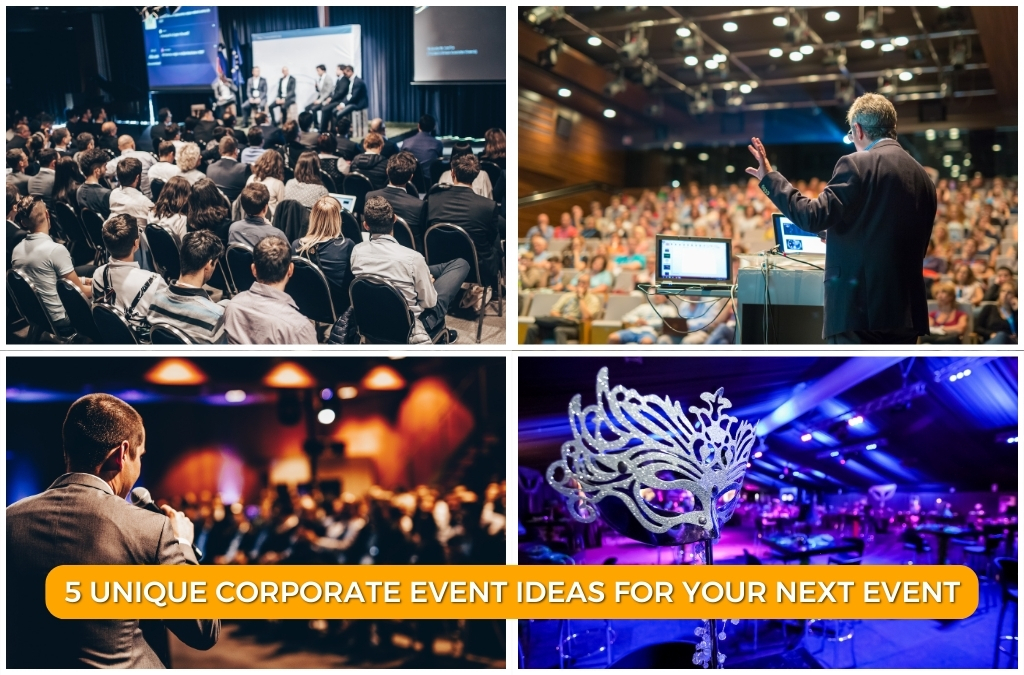Here are 5 unique corporate event ideas to inspire your next event:
1. Immersive Experience Event
Imagine transporting your guests to an entirely different world — a place where they can interact with their surroundings and be a part of the story. Immersive events do just that. From virtual reality to themed spaces that encourage active participation, immersive experiences create lasting impressions.
Example: For a tech conference, you could use virtual reality to take participants on a journey through the history and future of technology. They could virtually visit a lab in the 1950s or explore futuristic cities. Adding interactive touchpoints like holograms or augmented reality apps can make the experience even more engaging.
Why it works: Immersive experiences capture attention, keep your guests engaged, and leave them with unforgettable memories. This is particularly effective for product launches or corporate branding events, where you want your message to stick.
2. Pop-Up Events
Pop-up events are a growing trend in the corporate world. These temporary, unexpected events take over a space for a short period, creating an exclusive and buzz-worthy experience. The excitement of a “limited-time-only” event often increases demand and curiosity.
Example: If you’re hosting a product launch, instead of a traditional venue, why not take over a unique location, like an art gallery, rooftop, or even a train station? Incorporate elements that are temporary but eye-catching, like interactive displays, live art installations, or gourmet food trucks.
Why it works: Pop-ups are spontaneous, exciting, and give off a sense of urgency. The “here today, gone tomorrow” vibe drives attendees to participate and gives your brand an air of exclusivity.
3. Themed Team-Building Adventure
Traditional team-building activities can be effective but often predictable. Why not mix things up with a themed adventure that adds a sense of play and creativity to your event? Themed adventures, whether they’re escape rooms, scavenger hunts, or outdoor obstacle courses, can bring teams together while offering a refreshing change from the ordinary.
Example: Host a corporate retreat in the form of a mystery-solving adventure. Teams can work together to solve clues, escape from a mock crisis, or complete a themed puzzle, all while enhancing problem-solving, leadership, and communication skills.
Why it works: Themed adventures not only build team cohesion but also break the ice in ways standard events might not. Plus, participants tend to bond better over unique challenges, fostering stronger relationships among colleagues.
4. Hybrid Virtual Events with Global Collaboration
With the rise of remote work, hybrid events that blend physical attendance with virtual participation have become increasingly popular. These events can cater to attendees worldwide, allowing those who cannot be physically present to still engage meaningfully.
Example: For an international conference, you can have live presentations broadcast to participants worldwide. Utilise breakout sessions that bring together individuals from different locations to foster global cooperation. Virtual attendees can participate in real-time Q&A sessions, vote on polls, and network through interactive platforms.
Why it works: Hybrid events expand your audience reach while keeping participants engaged regardless of their location. They’re also cost-effective and environmentally friendly, as they reduce the need for extensive travel.
5. Corporate Wellness Retreat
Prioritizing health and wellness in the workplace has become a focal point for many companies. A corporate wellness retreat combines relaxation with productivity, ensuring that employees return refreshed and ready to perform at their best. These retreats often take place in natural settings and feature activities like yoga, meditation, and wellness workshops.
Example: Take your team to a peaceful countryside resort where they can disconnect from their screens, engage in mindfulness exercises, and participate in wellness workshops that focus on personal and professional development. Alongside traditional team-building exercises, provide wellness-focused sessions such as nutrition classes, fitness challenges, or nature hikes.
Why it works: Wellness retreats help combat workplace burnout while improving team morale and productivity. Employees appreciate the break from the office environment and come back with renewed energy and focus.

